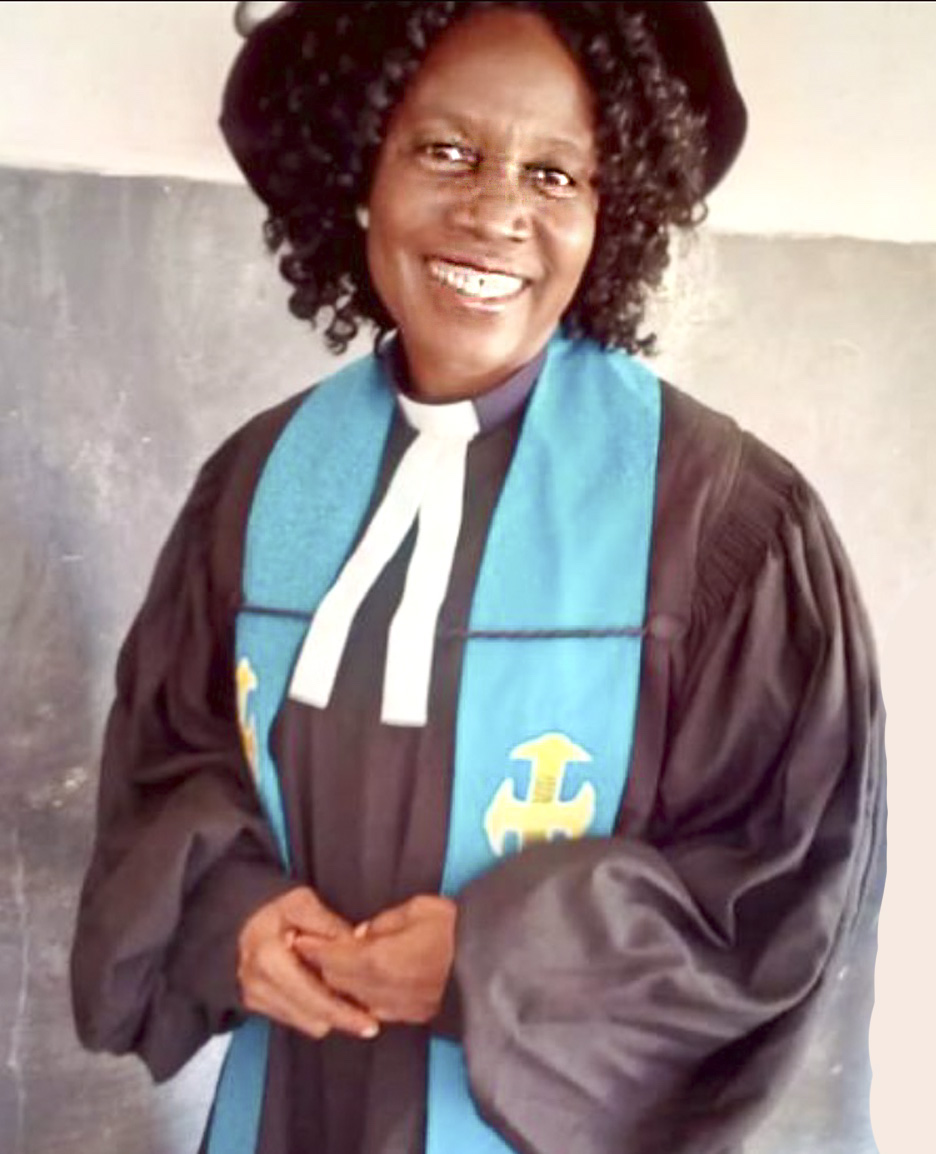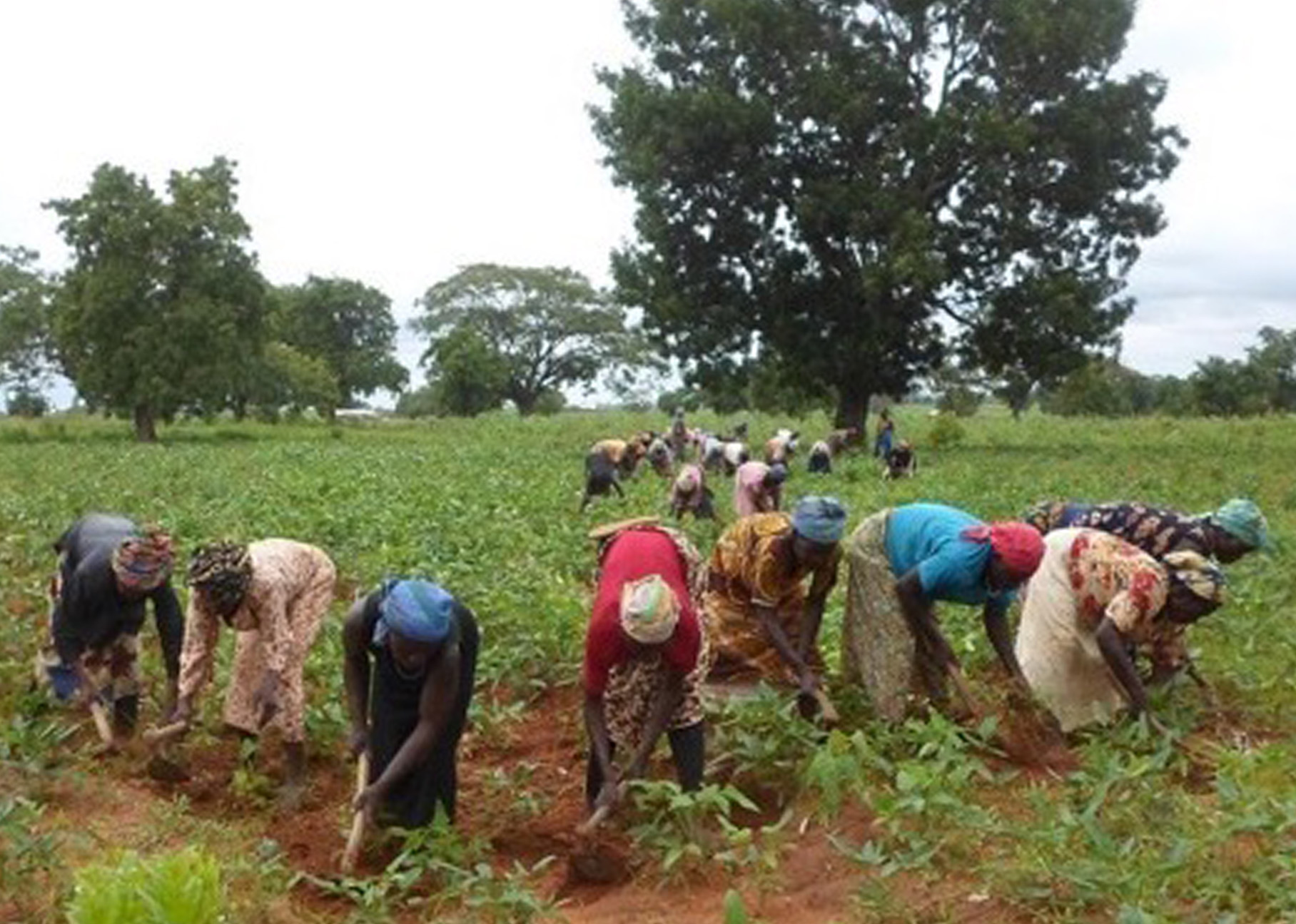A Letter from Ruth Brown, serving in Ghana
July 2019
Write to Ruth Brown
Individuals: Give online to E200528 for Ruth Brown’s sending and support
Congregations: Give to D507542 for Ruth Brown’s sending and support
Churches are asked to send donations through your congregation’s normal receiving site (this is usually your presbytery)
Dear friends,
A large stone, visible within a grove of trees, is believed to have powers to cleanse a person from possession by evil spirits.
“Generations ago, the ancestor of the current chief of the Gnani camp helped a woman, a newcomer to Gnani whose townspeople had accused her of witchcraft. This ancestor took the woman to the shrine [the stone] and annulled the woman’s powers of witchcraft. The woman, fearful of returning to her own town, settled on land near the shrine. Over the years, more and more people have come to Gnani to obtain annulment of evil powers and a safe place to live,” explained the chief’s brother on my second visit to the witch camp in the town of Gnani.
Every person accused of witchcraft is believed to have killed someone in his/her town. Many come to Gnani to escape retaliation by their townspeople. Today, more than 300 accused witches and wizards live in Gnani. The last notation in the chief’s record book is “349 witches in 2017.” On the same page, another notation reads, “217 men.” This is the only camp in Ghana where both accused men and women live. Other camps have only women. Accused men bring their whole families with them. At least 50 of the accused women are alone, but most are accompanied by one of their children and by grandchildren. These family members marry and usually remain in the camp with the accused. With 300+ accused witches plus their family members, the population of the Gnani camp numbers in the thousands.
Today, of help to the accused is the chief of the camp, the descendent of the first man to annul the evil powers. This current chief, Allasah Sehei, lives in the camp with his family. If any of the accused need medical assistance, food or a new roof, they ask the chief for help, and he usually assists them. According to camp residents, Chief Allasah Sehei knows which women have no family support, and he brings these women food during the “hunger months,” June – August, the months just prior to the new annual harvest.In researching what assistance Ghana’s two Presbyterian denominations have provided to witches’ camp residents, the same name surfaces: Rev. Gladys Lariba of the Presbyterian Church of Ghana (PCG). Rev. Gladys has led her church’s outreach to accused women of the Gambanga camp in the western area of northern Ghana. And she has developed the church’s outreach into a special mission of the PCG: the “Gambanga Go Home Project.”
Over the phone this week, Rev. Gladys told me about her church’s work in the Gambanga camp. “We visit the women every day. We learn their stories. We hear their wailing and sit with them in their tears when they first arrive. We give counsel and tell them of God’s love and Jesus’ love. We invite them to our church in town. In the evenings, we have Bible lessons in the camp. A Baptist minister holds church services in the camp. Many have been baptized.”
“Tell me more about how you chose the name of your program,” I requested.
Rev. Gladys explained, “The women of the church and I go to the towns of the accused, and first we ask to meet with the town’s chief. The chief then calls the town’s elders together, and we explain that we are Christians. We explain that we have been working with the accused every day and that nothing has ever happened to us. We explain that we are a church, that Jesus loves everyone, and that we are hoping to build a relationship between the family and community members and the accused. The chief then calls the family members, and we go to visit in the family home. There, we learn the family relationships and work to restore communication between the children and their parent (the accused) who is removed from her home and her children.” It is often difficult for married children with spouses and children of their own to visit their parents or to live in the Gambanga camp to assist their accused mothers. Yet it is often possible to re-establish the home in another location relatively close to the families’ town. “Many children have been willing to move their homes in order to bring their mothers back from the camp to live with the family.”
Rev. Gladys’ work has been encouraging as I have begun visiting the Gnani camp. Dr. Seth Agidi, moderator of the General Assembly of the Evangelical Presbyterian Church, Ghana, gave only one directive to me when I met with him in Ho upon my departure for Saboba last September: “I hope you will be able to assist the people in the witches’ camps.” I visit the camp in Gnani (which is about a 1.5-hour motorcycle trip from Saboba) for at least 3 days every month. This June, I accompanied the program officers of both the Evangelical Presbyterian Disaster and Relief Agency (EPDRA) offices of Yendi and Saboba to the Gnani camp, where we listened to farmers — 14 men and 14 women — tell us about their experiences with agriculture.
“We have to ask local farmers to use their land. All of our own land is back in our towns, but we cannot return to farm there. We have borrowed land here in Gnani, and the location of the fields may be different from year to year. We cannot depend on the same piece of land each year, so we may not have enough information to be able to rotate the crops.” Reports of their harvests indicate that production is only about 1/5 the amount possible if proper fertilizers and planting methods are used. The EPDRA leaders are planning ways to assist these farmers produce a more plentiful harvest.
All the farmers present with us were in agreement that, should EPDRA find the resources to assist them, they would donate a portion of their harvest to be stored for food for the 50+ women in the camp who have no family members providing food for them. EPDRA leaders are currently writing an application for a Presbyterian Women’s Thank Offering grant to provide a sustainable agricultural program with leadership and field training for 50 families in the Gnani camp.
Thank you for the support that makes this partnership with the Presbyterian churches in Ghana possible. I could not be here without your prayers and your gifts to my sending and support. If you have not yet made a contribution in support of this partnership, please consider this. Please let me know if you have questions or concerns about the work or how the donations are used. In this season of farming, please also look ahead to planning support of Presbyterian Women’s Thank Offering. The Thank Offering grants help families, especially women and children, throughout the world.
We ask for your prayers for the people of the witches’ camps in Ghana and for our ability to be of assistance to them.
Love to you –
Ruth
![]() You may freely reuse and distribute this article in its entirety for non-commercial purposes in any medium. Please include author attribution, photography credits, and a link to the original article. This work is licensed under a Creative Commons Attribution-NonCommercial-NoDeratives 4.0 International License.
You may freely reuse and distribute this article in its entirety for non-commercial purposes in any medium. Please include author attribution, photography credits, and a link to the original article. This work is licensed under a Creative Commons Attribution-NonCommercial-NoDeratives 4.0 International License.


